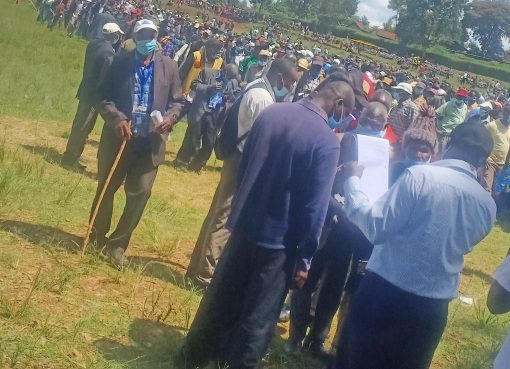The Nakuru County governor, Lee Kinyanjui is set to sign into law a key bill that paves way for development of legal framework needed to support the devolved unit’s elevation to city status.
Kinyanjui confirmed that signing into law the Municipal Charter 2019, sponsored by Lands, Housing and Physical Planning committee Chairman, Stephen Ngethe and ratified by County Assembly will pave way for establishment of Municipality Board.
“Immediately I sign the bill into law a nine-member Municipality Board will be constituted in line with the Urban Areas and Cities Amendment Bill of 2017.
As far as other parameters that should be considered such as a town’s population before granting it city status are concerned, we are ahead of the pack. By passing the bill and signing it into law we will have overcome one of the major bottlenecks that have slowed the journey of one of Kenya’s oldest towns to being a city,” said the governor.
In September 2017, the Urban Areas and Cities Amendment Bill got the cabinet’s nod, paving way for the creation of two new cities in Kenya.
Nakuru and Eldoret towns, which are considered the third and fourth largest towns in the country, were earmarked for elevation to city status. But close to two years later, Nakuru is yet to achieve that coveted status.
“This Municipal Charter 2019 will facilitate the immediate implementation of the provisions of the Urban Areas and Cities Act, which will go a long way in improving service delivery within Nakuru and Naivasha Municipalities. The approval of this charter is also instrumental in the process of Nakuru attaining its city status” noted Mr. Ngethe.
The draft Charter Bill was submitted to the Lands, Housing and Physical Planning committee on November 28th last year. However the committee did not table it before the County Assembly on time, only doing so barely a week before the Assembly went on recess.
Four members to the Municipal Charter 2019 will be nominated by the County Executive Committee. Their nomination shall be subject to approval by the County Assembly.
The remaining five members shall be nominated by lobbies that represent professional associations, private sector, registered associations of the informal sector, registered neighbourhood associations and an association of the Municipality.
“In appointing members of the Board, the County Executive Committee shall ensure gender equity and representation of persons with disability, youth and marginalized groups. The term of the members shall be five years on a part-time basis,” said Kinyanjui.
Upon approval, the Nakuru City Upgrade Committee, which is led by County Executive Member for Water and Environment, Festus Ng’eno, will be tasked to come up with another Bill – The City Charter Bill.
It is this Bill that shall finally see the formation of a city board of not more than 11 members, which will take up the roles of the municipal board, and eventually run Nakuru like a city.
The governor however affirmed that passing of necessary legislations should be complemented with infrastructural development and qualified personnel for Nakuru to function like a modern city.
The Central Business District (CBD), he stated was grappling with traffic gridlocks and congested main bus terminus. The bus terminus has single entry and exit points, which lead to enormous traffic jam.
“We need to relocate public service vehicles from the CBD. My administration is sourcing for land to construct a modern bus park. All stakeholders will be involved to ensure that relocation is conducted in a dignified and orderly manner” said Kinyanjui.
However, in order for this planning to occur, the county administration has to look for alternative ways of funding, since no such plans were included in the 2018/2019 budget.
To achieve this, the county government may have to seek alternative sources of funding to buy such land, as this was not factored in the 2018/2019 financial year budget.
Another challenge is the lack of cooperation from the business community, which has failed to comply with some important gazette notices, such as those requiring business premises to be renovated and repainted.
For improvement of the town’s infrastructure, the county government received Sh.1 billion funding from the World Bank. The money will go to construction of a housing project through the Kenya Urban Support Programme.
Already, the county has rolled out several projects towards achieving city status.
Some of the projects the governor is talking about are the reconstruction and rehabilitation of low-volume sealed roads by county and national governments at the cost of Sh.2 billion.
“To upgrade infrastructure in the town, the devolved unit jointly with the Kenya Urban Roads Authority (Kura) in January last year, embarked on a road upgrade programme to link several residential and commercial centers in the town. About 22km of roads have been covered by the project” stated Kinyanjui.
The roads that have undergone an upgrade, include those that serve Menengai and the posh Milimani estates, the ones accessing Nakuru GK Prison, London estate and part of the western side of the town.
They also link Industrial Area, Kaptembwa, Bondeni, Naka, Free Area and Mwariki estates of the eastern part of the town.
Kinyanjui says the project is intended at increasing road network and mobility and reducing congestion in the town.
“My administration is leaving nothing to chance to ensure Nakuru gets the city status. We are also in the process of upgrading health facilities, greening of the town through tree planting, beautification and rehabilitation of public parks, including Nyayo Gardens, and enforcement of the Buildings Code and Physical Planning Act,” the governor said.
Meanwhile, the county and the concerned national government agencies are determined to overcome hurdles that could stand in their way. These include poor urban planning, faulty drainage system and inadequate sewer lines.
By Anne Mwale


